1937: Lucille La Verne in "Snow White and the Seven Dwarfs"
 Thursday, September 23, 2021 at 6:00PM
Thursday, September 23, 2021 at 6:00PM The 1937 smackdown arrives on Sunday October 3rd. Before each Smackdown Nick Taylor suggests alternates to Oscar's Supporting Actress ballot.
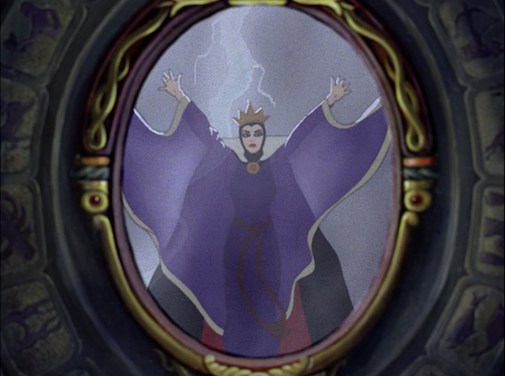
by Nick Taylor
The Evil Queen of Snow White and the Seven Dwarfs is the first character in any animated feature to speak on screen. Her voice is provided by Lucille La Verne, a storied theatre actress who’d gone on to have a wildly successful career in silent cinema, and who would ultimately give her final performance for this film. It’s about as iconic a farewell as one could hope for. Her rendering of the Queen is one of the many achievements that would make Snow White an instant classic, and Walt Disney Animation into a medium-defining juggernaut. With so much of The Queen’s impact derived from Snow White’s groundbreaking visual elements, there’s a degree to which the character would shine even without such a commanding voice. Yet, by the same token, La Verne’s contribution would flourish even in a less auspicious version of this tale, endowing her Evil Queen with a ruthless, unrepentant menace and villainous glee. Her look is immortal, but where would she be without her laugh?
It’s almost beside the point to offer any kind of plot summary on Snow White, but allow me a brief retelling...
Snow White (Adriana Caselotti) is a kind, doe-eyed princess who’s been given the work of a scullery maid by her vainglorious stepmother (La Verne), who fears that one day the girl’s beauty will eclipse her own. Eventually her Magic Mirror announces Snow White is the fairest in the land, and the Queen tasks her Huntsman with cutting out the child’s heart and delivering it to her. But the man balks, and when she realizes his failure, she decides to slay the girl herself. She drafts herself a potion to transform into a hideous crone, and brews a poisoned apple that will cast Snow White into an eternal slumber with one bite. And does she succeed? Well...
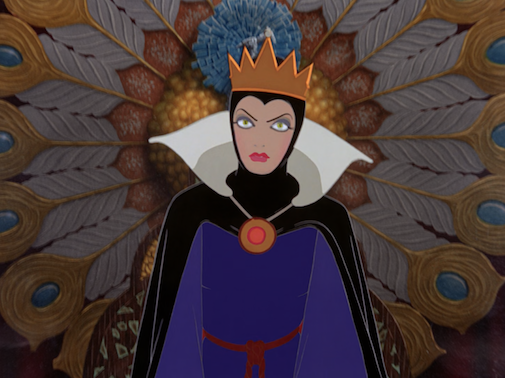
Other folks have made this observation before I have, but it’s noteworthy how much the Queen supplies Snow White with its narrative propulsion. There’s a story in Snow White’s time with the dwarfs, sure, but it’s the Queen’s monstrous vanity that gives Snow White its reason for being. The chauvinist misogyny baked into the thing is unavoidable, but for me, it’s so easy to delight in the Evil Queen’s visual extravagance and La Verne’s perfectly scaled villainy. The bigness of her cape, the volume of her cackle, the simplicity of her lines and colors, the expressiveness of her face - she’s magnetic in whatever configuration she’s drawn. Her face is an amalgamation of '30s screen divas, mainly Joan Crawford, Marlene Dietrich, and Gale Sondegaard, with a dash of Greta Garbo.
I’m not sure who among supervising director David Hand and a coterie of sequence directors to credit for this decision, but it’s striking how often she either stares directly into the camera or looks just past it. It’s an unnerving device, not just demonstrating her force of will but imposing it onto the viewer. At times it’s strangely intimate, particularly in the scenes where she’s brewing potions in her underground lair with only her raven familiar for company. It’s hard not to think she’s talking to us, and it only makes the next time she stares into the camera during her encounter with Snow White so tense and terrifying.
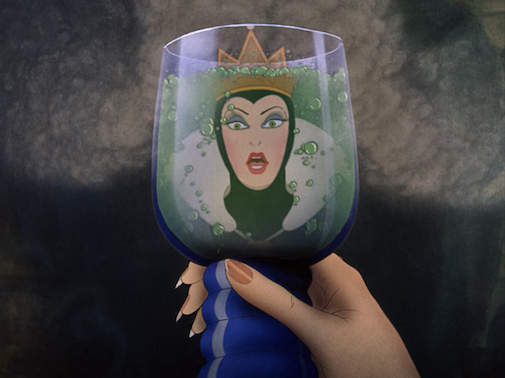
La Verne’s performance is entirely in service to The Evil Queen’s literary archetype, and she meets those demands gloriously. There isn’t room for her to reinvent the wheel, but she manages to exemplify it with her commitment to the woman’s cold-blooded contempt and assuredness. More than that, there’s something to be said for acting achievements that capably shade an archetypal, evocatively written role rather than subverting or complicating it. La Verne’s menace never wavers, and Snow White is stronger for how muscular and clearly defined her characterization is.
It also helps that the film’s script knows exactly what contexts to show her in. She’s always either in an authoritative position, manipulating someone, or scheming in her lair. The Queen refuses to wallow or throw a tantrum when she learns Snow White is alive, and aside from her victorious stare at the girl after she bites the apple, there’s no scenes of her celebrating. She’s simply relentless, borne from an assuredness in her own magnificence and her practical application of it to further her own ends. I love how, in her very first scene where the Mirror tells her she’s no longer the fairest in the land, the Queen’s first impulse is to say the maiden will be lashed without a second thought. Not for a second does she consider this mystery girl an immovable obstacle - if the Mirror won’t name the Queen, she’ll damn well do the work to make it name her. Only when she learns the maiden is Snow White does she become threatened, and she moves quickly to dispose of her enemy.
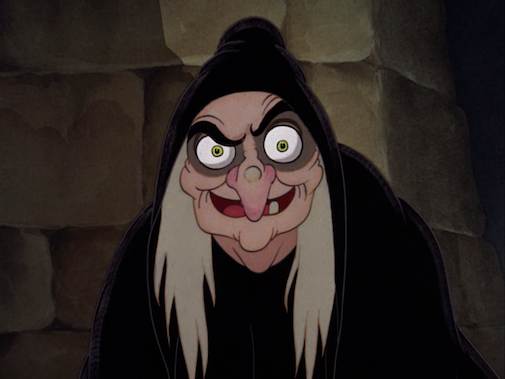
Still, as grave and imposing La Verne’s Evil Queen is, she best distinguishes herself once the Queen transforms herself into an old crone. It’s astounding to witness this vain woman so easily discard her beauty for the sake of offing the competition, and La Verne’s unbeatable cackle turns this sacrifice into a glorious tribute to her own ingenuity and villainy. It takes work to pull off such a powerful disguise spell, and still even more work is necessary to track down and trick her stepdaughter. The Queen’s glee is topped off by her own certainty that she now has all the necessary tools to finally rid herself of Snow White. In no time at all she’s flipping through spellbooks to find the right way to annihilate her stepdaughter. When she describes with wicked delight how her apple will send Snow White into an eternal slumber, tricking the dwarfs into thinking she’s died and letting them suffocate her when she’s buried in the ground, it feels almost conspiratorial.
Fun fact: La Verne changed her voice for the crone by removing her false teeth!
This, of course, leads to her pas de deux with Snow White in the dwarf’s cottage. The Queen barely pantomimes the role of the helpless old woman, asserting herself into the cottage and offering the girl a delicious red apple. Here La Verne gets to flex her voice into the realms of false obsequiousness overlaid atop giddy anticipation. Her disguise is the shroud of temptation she wields over Snow White, promising true love if she would only take a bite from the apple. It’s hard to imagine the old crone doesn’t spook Snow White even a little bit, yet the girl’s trepidation is no match for the treasures La Verne promises with such covetous excitement. And nothing tops her hushed, almost reverent recitation of the apple’s effects once they take hold. The Queen looks like she can barely articulate her triumph, yet it takes her no time to let loose with another hideous laugh.
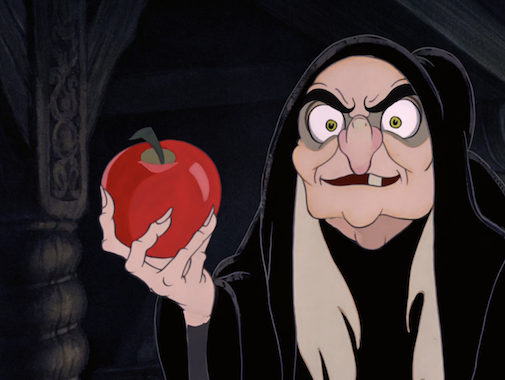
I’m sure this has been explicitly stated in these posts before, but my own write-ups are more about interesting alternatives than people who clearly had a shot and missed. Still, it's fun and fascinating to imagine what the ripple effect of the Academy nominating a voice performance so early in its existence might have been. Much like the continued shut-out of documentaries from any Best Picture lineup, I’m as curious as anyone else about what film will finally overcome this hurdle, and which boxes they’ll have to tick off to make it happen. These sorts of hypotheticals always swing me around to the question of “couldn’t they have done it earlier?”, which brings us back to Snow White, which offers such an iconic, platinum-class example of how good voice acting can really elevate a film while totally serving it that it’s hard to imagine a nomination for La Verne not having an impact on the Oscars going forward.
Even if a nomination for La Verne’s work as the Evil Queen wouldn’t have led to much alterations in how voice work is rewarded, it would still be a tremendously deserving citation for one of the best villains to grace the silver screen. Her Evil Queen fits into a familiar fairytale archetype while redefining its contours and potentialities for generations of evil stepmothers and wicked queens and dark magicians. You can see her influence everywhere. And yes, it’s a tribute to the invaluable animators who drew her that she’s the legend she is today. There is no Evil Queen without the work of those artists. But by that same token, there is absolutely no Evil Queen without the mad, cackling voice of Lucille La Verne.
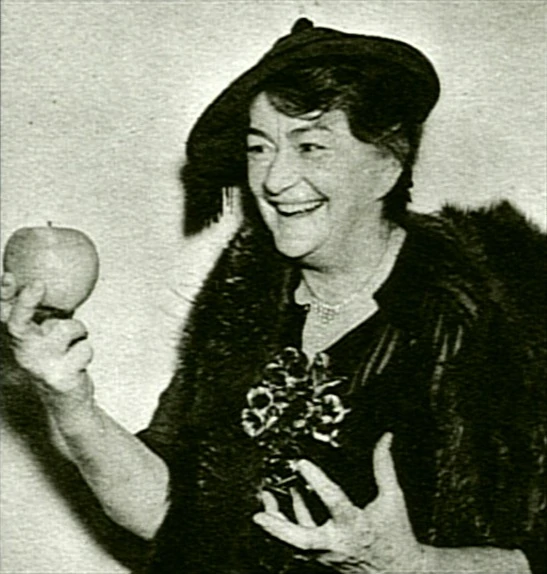
previously: Fay Bainter in Make Way for Tomorrow



Reader Comments (1)
The Evil Queen is the most interesting character in Snow White by a mile. Her eyebrows alone have more character than Snow White. And I never would have guessed that the same actor voiced both the Evil Queen and her old crone disguise. Really excellent work.